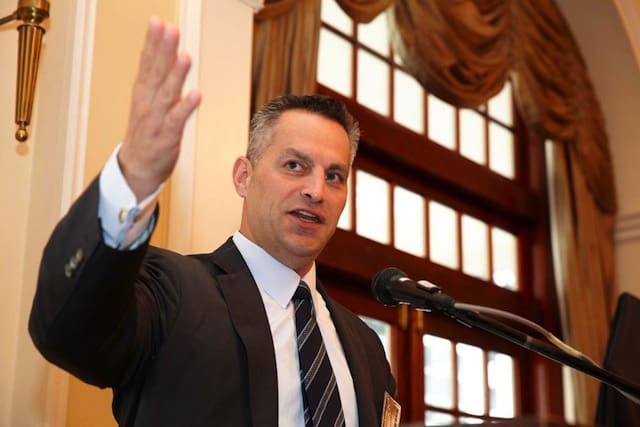“After a nearly yearlong effort to sell its gun business, Cerberus Capital Management LP is close to bringing on a minority investor and lender to the weapons maker to let some of its investors sell out, a person familiar with the matter said.” As wsj.com points out, Steven A. Feinberg’s minions have been looking to punt, indeed promising to punt the Freedom Group (FG) for almost a year, after it was revealed that Newtown spree killer Adam Lanza used a Bushmaster AR-15 for his murderous spree. Spurred on by The California State Teachers Retirement System’s decision to pull some $15m out of the Freedom Group in protest. The sales process has been, shall we say, fraught. As the wsj reports . . .
Cerberus hasn’t reached an agreement with a buyer. The sales process has been complicated by several factors, including subsequent high-profile shootings and financing issues for some possible bidders, the person familiar with the matter said. Some offers were lower than what Cerberus thought was fair, the person said. In addition, some private-equity firms looked at the company but dropped out in early September, the person said.
Cerberus had originally sought around $1 billion for the business, a person familiar with the matter said. The new planned deal, including about $200 million in a credit facility, values the business at around $1.2 billion.
I’m not buying it (so to speak).
Despite a rising tide lifting all gun manufacturers (FG’s quarterly revenues rose 46 percent from last year to $347.1 million, earnings doubled to $31.2 million) the agglomeration of competitive and non-synergistic firearms-related enterprises known as the Freedom Group has managed to screw the pooch. Marlin is dead in the water. Bushmaster’s got quality control problems. AAC has lost its edge. And so on.
In short, the Freedom Group has run down the value of its brands, which have sweet FA to do with each other. They’re worth more sold separately than as a group. The real question is this: who’s the mystery minority investor? There was talk of current FG CEO George Kollitides [above] investing his personal fortune in the Group. We shall see . . .





“the agglomeration of competitive and non-synergistic firearms-related enterprises”
I hated you for this phrase until I read it again and realized it wasn’t just corporate doublespeak, it actually makes sense. Sorry for overreacting; I have a knee-jerk reaction to “synergy.”
On topic, I still don’t understand what this means. Would an individual investor with really deep pockets come in and buy up the stock of those who wanted out? Or buy up pieces of the compan(ies), but not entire brands?
The story indicates that TFG is selling part of the group to a private investor, allowing current investors who want out, out.
Yeah, I guess I’m being obtuse, or I don’t speak business, because I don’t understand what the final result of that would be. Guess I’ll just wait and see how it shakes out.
Among other degrees, I have an M.B.A., so I’ll give it a shot. TFG is a conglomerate, meaning it’s one umbrella business structure that in turn owns multiple independent businesses. Private equity groups (gatherings of wealthy individuals and institutions who join to make major investments, often whole company purchases), like Cerberus, will buy firms hoping to improve results and then sell off to other investors. Think of it like house flipping. Could be to other private equity groups or to the general investing public via the stock market.
In this case, buyers are scarce and what buyers there are either have credit problems or don’t agree on purchase price. Because TFG group is privately held, i.e., they aren’t listed on the stock exchange already, they can’t just sell off shares as needed to regular people who buy in, say, 100 share lots. So they need to arrange a purchase with one big buyer.
Once found, that buyer pays for a portion of the company as a whole, gets a portion of overall profits, and probably a seat on the board. Meanwhile, some existing share owner gets that buyer’s money in exchange for relinquishing their share of ownership.
If the buyer is secret and a minority owner, they probably just want this as an investment and don’t want to participate in actual management of the business. In the short run, there won’t be any visible change to TFG, just a rotatition of the suits in the suites.
Ah, that’s the part I was missing. Somehow I didn’t realize they were privately held, so my idea of “can’t they just sell their stock if they don’t want to be involved anymore” made perfect sense to me.
Somewhat analogous to house flipping, but if I were trying to flip a house, I don’t think I’d be letting my dog take dumps on the carpet. Bad Cerberus, Bad! (Ironic company name if you’re not aware: http://en.wikipedia.org/wiki/Cerberus )
Another cluster f* by Cerberus. Look at what they did to Chrysler. All IMHO, ‘natch.
And almost destroyed Home Depot, if we’re speaking about Nardelli.
This would be a great time for a private investor or 2 to take these manufacturers out of public holding and bring back quality products instead of feeding a bunch of stockholders.
They thought it was worth 1 billion before and this deal would value it at 1.2. So explain how they have run the value into the ground?
It’s about money to them. Not a hobby.
Something is worth exactly what someone will pay for it. They can value the business any way they like. It all comes down to the purchase price.
Was this snark, or does the fortune in question come from a marriage? Not being nasty or pedantic, just don’t know…
“There was talk of current TFG CEO George Kollitides [above] investing her personal fortune in the Group”
Typo. Fixed. Thanks.
Nardelli didn’t just screw the pooch for Chrysler. He left Home Depot as they were caving and took $200 million as an exit. Everything he has touched has failed. His efforts at Home Depot were to switch them from about 70% full timers to 30% full timers. That’s why they never knew anything when you went in to ask a question. He got rid of the full timers to show a short term gain in stock price so he could leave with a bundle as they were falling apart. HD is slowly coming back. He left Cerrubus in ’12 but is still an advisor. He probably had a great deal in destroying the quality of several firearms manufacturers and left, once again, with a bundle
He is just a typhoid Mary for any company that wants to bleed money to him as he leaves them high and dry.
+1
Exactly. Nardelli is a world-class moron in the business world. With his track record, I have no idea how he gets a job.
The Freedom Group will run their acquired companies into the ground and Cerberus will leverage a sale of the remains and brand names. The entire episode should stand as a prime example to owners of small, well-run companies why, if you care about your name, reputation and employees, when the Wall Street private equity types show up at your front door, bearing cases of cash, you should refuse their offers and send them packing.
Moron? He may not know how to run a business, but he sure knows how to suck the blood money out of it. I wish I were so stupid that I could get a $200 million payout to go away….It’s like the movie “Wall Street,” it’s all about the money, not about the product, not about the company, and not about the employees. Some call it capitalism, I personally call it corporate thievery. Legal, but immoral, or perhaps even amoral. But not good for America.
Agree. There is a cycle in the investment world for this idea of buying up lots of companies for horizontal and vertical integration. Sometimes it works if the companies are related and management is really smart and hard working. The problem for the PT Barnum LP buyers who invest* at the behest of the smartest guys in the room investment bankers who pitch it, is it usually doesnt work but thats ok, cuz the bankers and the MP can make their money and move on.
Its easy to talk technology improvements, synergy and so on, but in most cases it comes down to maxing out cash, stripping assets and selling the bits – you cash out, look like a hero to the clueless journalists in the media for awhile, and go on the next one- this would be Nardelli’s modus operandi.
Of course, the strippers leave the core assets weaker than before, especially in people intensive businesses where once you lose the “brand” which came from institutional memory and quality it took years to create and the even more years it would take to it back, if ever. Trust once lost is hard to regain, especially in the gun community. Bill Ruger?
Lets hope this private investor gets it. Sometimes they do, and if not, sometimes they can help company managers to do a reverse LBO to get out of the mess.
With interest rates so artificially low it is easy to use OPM to pull this stunt over and over, so it remains to be seen what the intent is. Could be just be a wash, rinse, repeat, although I doubt it given the mistrust in the customer base.
In the end, creative destruction works, and if old line companies cant adapt, I’d rather see upstarts sprout, like JP and others. Too bad about Winchester, but then again- too bad about Merrill and the golf playing CEO. They stopped minding the store and their greed took them down too.
* a sucker born every minute
I’d like to be able to buy a decent Remington or Marlin. When’s that gonna happen?
As soon as quality means more than quantity to a manager who actuallyhas a say.
The same way you find a high-quality rifle like a pre-64 Winchester: you cease looking for a new one and start perusing gun shows, online listings and gun racks looking for a used one.
+1. And collectibles are going up in value, as is art- which some of the older guns are – true examples of fast vanishing uniquely American craftsmanship.
Maybe it is secretly George Soros or Michael Bloomberg who are investing in the group.
Erm, nitpicky statement, but isnt Freedom Group stylized as Freedom Group instead of The Freedom Group?
Otherwise carry on.
Yes. Amended.
Too bad it was a typo… 😉
“In Unusual Move, Cerberus to Sell Gun Company” December 18, 2012.
“Colorado ammo magazine maker Magpul threatens to leave state over gun bill” February 14, 2013.
Among gunnies, praise for Magpul was effusive and criticizism of Cerberus was loud and rancorous.
They both lied to us, but maybe we had it backward.
more evidence that being tainted by “private equity groups” means you might as well go shopping for your own gravestone.
Comments are closed.